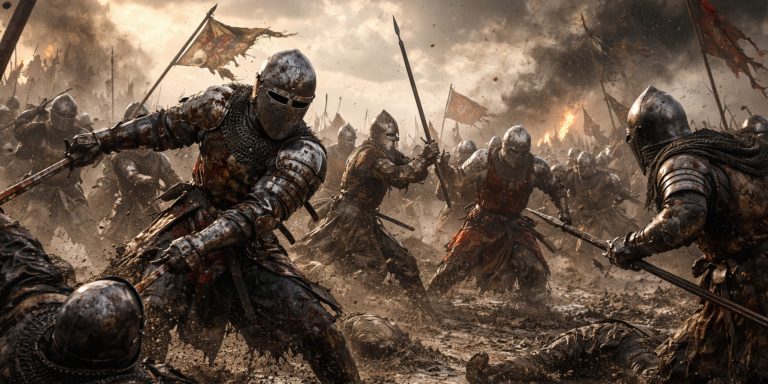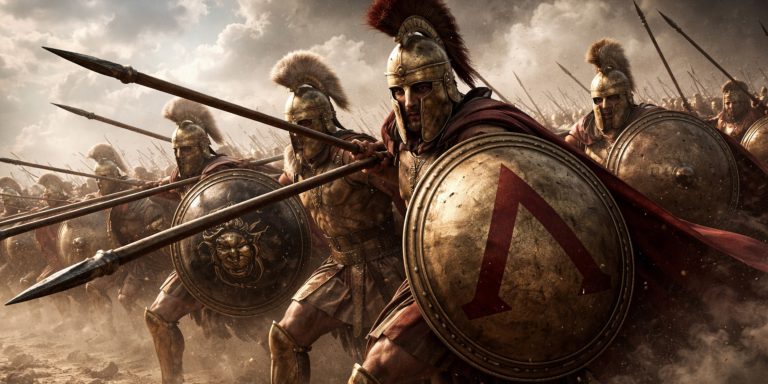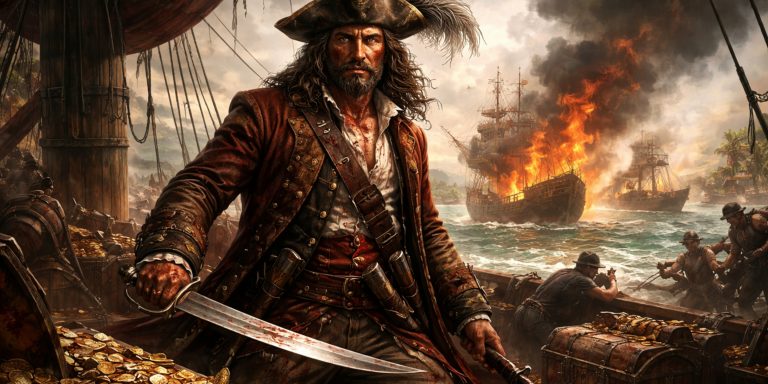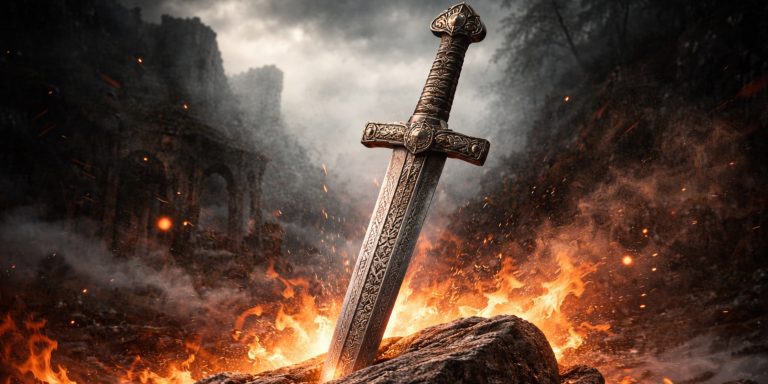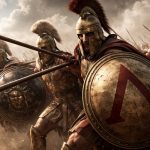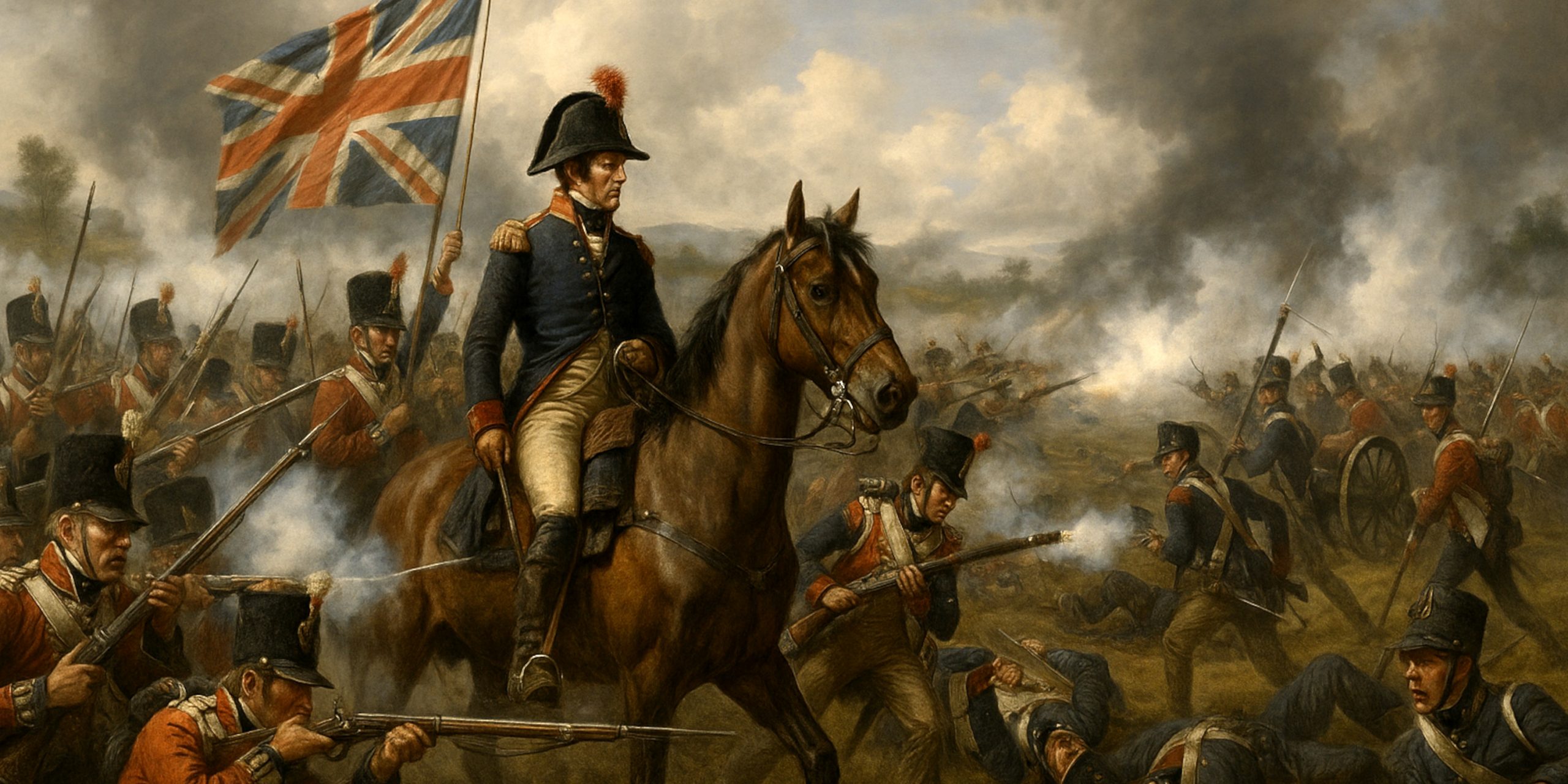
The Peninsular War, fought between 1807 and 1814, was one of the most grueling and strategically decisive campaigns of the Napoleonic era. It pitted Napoleon’s empire against the allied forces of Britain, Portugal, and Spain in a struggle that drained French resources and morale. The campaign honed the leadership of Arthur Wellesley, later the Duke of Wellington, and set the stage for the final downfall of Napoleon.
19. Battle of Roliça (1808)
Summary:
The first major engagement fought by British troops in the Peninsular War. Wellington’s tactical flanking manoeuvre forced Delaborde’s French to withdraw in good order.
Commanders:
- Britain: Sir Arthur Wellesley
- France: General Henri Delaborde
Troop Estimates:
- British: 14,000
- French: 4,000
Weapons Used:
Brown Bess and Charleville muskets, 6-pounder field guns.
Outcome:
British victory.
Legacy:
Marked the start of Wellington’s campaign and proved British troops could outmanoeuvre the French.
18. Battle of Vimeiro (1808)
Summary:
Wellington repelled Junot’s attacks by using reverse-slope defence on the ridges near Vimeiro.
Commanders:
- Britain: Sir Arthur Wellesley
- France: General Jean-Andoche Junot
Troop Estimates:
- British: 17,000
- French: 13,000
Weapons Used:
Brown Bess muskets, French sabres, light artillery.
Outcome:
Decisive British victory.
Legacy:
Ended the first French invasion of Portugal and led to the controversial Convention of Cintra.
17. Battle of Corunna (1809)
Summary:
Sir John Moore’s army, retreating to the coast, fought off a pursuing French force long enough to evacuate to England.
Commanders:
- Britain: Sir John Moore
- France: Marshal Soult
Troop Estimates:
- British: 14,000
- French: 20,000
Weapons Used:
Brown Bess muskets, Charleville muskets, 6-pounder guns.
Outcome:
British tactical victory; Moore killed in action.
Legacy:
Preserved the British army and demonstrated its discipline under extreme hardship.
16. Battle of Oporto (1809)
Summary:
Wellington’s bold daylight river crossing at Oporto caught Soult by surprise and forced the French into retreat.
Commanders:
- Britain: Arthur Wellesley
- France: Marshal Soult
Troop Estimates:
- Allies: 20,000
- French: 23,000
Weapons Used:
Brown Bess muskets, rifles, field artillery.
Outcome:
Allied victory.
Legacy:
Restored northern Portugal and raised Allied morale.
15. Battle of Talavera (1809)
Summary:
Wellington and Spanish General Cuesta resisted repeated French assaults by Marshal Victor, holding firm through intense musketry exchanges.
Commanders:
- Allies: Arthur Wellesley, General Cuesta
- France: Marshal Victor
Troop Estimates:
- Allies: 52,000
- French: 46,000
Weapons Used:
Brown Bess and Spanish M1752 muskets, French cavalry sabres.
Outcome:
Allied victory, though with high casualties.
Legacy:
Earned Wellesley his peerage as Viscount Wellington and signalled Britain’s growing commitment to Iberia.
14. Battle of Busaco (1810)
Summary:
Masséna’s troops attacked Wellington’s ridge positions but were thrown back with severe losses.
Commanders:
- Britain: Arthur Wellesley
- France: Marshal André Masséna
Troop Estimates:
- Allies: 25,000
- French: 60,000
Weapons Used:
Brown Bess and Baker rifles, French Model 1777 muskets.
Outcome:
Allied victory.
Legacy:
Showed the effectiveness of Wellington’s defensive tactics.
13. Lines of Torres Vedras (1810–1811)
Summary:
A vast network of fortifications constructed north of Lisbon where Wellington halted and starved Masséna’s army into retreat.
Commanders:
- Britain: Arthur Wellesley
- France: Marshal Masséna
Troop Estimates:
- Allies: 60,000
- French: 65,000
Weapons Used:
Fortified artillery, muskets, Baker rifles.
Outcome:
Strategic Allied victory.
Legacy:
Transformed Portugal into an impregnable Allied stronghold and devastated the French campaign.
12. Battle of Barrosa (1811)
Summary:
A combined Anglo-Spanish force under Graham broke the French attempt to maintain the siege of Cádiz.
Commanders:
- Britain: Sir Thomas Graham
- France: Marshal Victor
Troop Estimates:
- Allies: 15,000
- French: 20,000
Weapons Used:
Muskets, rifles, light cannon.
Outcome:
Allied victory.
Legacy:
Lifted the siege of Cádiz and boosted Spanish morale.
11. Battle of Sabugal (1811)
Summary:
A fog-shrouded clash between the British Light Division and Reynier’s French corps ended in a decisive British success.
Commanders:
- Britain: Major-General William Erskine
- France: General Jean Reynier
Troop Estimates:
- British: 9,000
- French: 15,000
Weapons Used:
Baker rifles, Brown Bess muskets.
Outcome:
British victory.
Legacy:
Ended the third French invasion of Portugal.
10. Battle of Albuera (1811)
Summary:
Fought in heavy rain, Beresford’s army resisted Soult’s assault in one of the bloodiest engagements of the war.
Commanders:
- Allies: William Beresford
- France: Marshal Soult
Troop Estimates:
- Allies: 35,000
- French: 25,000
Weapons Used:
Brown Bess and Baker rifles, horse artillery, sabres.
Outcome:
Indecisive tactically but strategic Allied success.
Legacy:
Demonstrated Allied resilience and the brutality of Peninsular combat.
9. Battle of Fuentes de Oñoro (1811)
Summary:
Wellington held his position against Masséna’s larger army during a series of fierce engagements on the Spanish border.
Commanders:
- Britain: Arthur Wellesley
- France: Marshal Masséna
Troop Estimates:
- Allies: 36,000
- French: 45,000
Weapons Used:
Baker rifles, Brown Bess muskets, French lances and sabres.
Outcome:
Allied victory.
Legacy:
Secured Portugal permanently for the Allies.
8. Battle of Ciudad Rodrigo (1812)
Summary:
A rapid siege that ended with Wellington’s troops storming the walls in two weeks.
Commanders:
- Britain: Arthur Wellesley
- France: General Barrié
Troop Estimates:
- Allies: 35,000
- French: 2,000 (garrison)
Weapons Used:
Siege guns, mortars, ladders.
Outcome:
Allied victory.
Legacy:
Opened the route into Spain for future offensives.
7. Battle of Badajoz (1812)
Summary:
A ferocious night assault through breaches and over walls, followed by heavy civilian casualties.
Commanders:
- Britain: Arthur Wellesley
- France: General Philippon
Troop Estimates:
- Allies: 35,000
- French: 5,000
Weapons Used:
Heavy siege artillery, grenades, scaling ladders.
Outcome:
Allied victory with severe losses.
Legacy:
One of the war’s bloodiest sieges; vital for opening southern Spain.
6. Battle of Salamanca (1812)
Summary:
A brilliant tactical strike by Wellington against Marmont’s overextended flank shattered the French army.
Commanders:
- Britain: Arthur Wellesley
- France: Marshal Marmont
Troop Estimates:
- Allies: 48,500
- French: 50,000
Weapons Used:
Baker rifles, Brown Bess muskets, Gribeauval artillery.
Outcome:
Decisive Allied victory.
Legacy:
Opened Madrid to the Allies and cemented Wellington’s reputation as a strategist.
5. Battle of San Sebastián (1813)
Summary:
After a failed first assault, Allied forces captured the town in a second storming marked by fierce resistance and destruction.
Commanders:
- Britain: Arthur Wellesley
- France: General Emmanuel Rey
Troop Estimates:
- Allies: 30,000
- French: 3,000
Weapons Used:
Heavy siege guns, mortars, sappers’ tools.
Outcome:
Allied victory.
Legacy:
Opened the northern route into France.
4. Battle of the Pyrenees (1813)
Summary:
A series of mountain engagements as Soult attempted to counterattack following the French defeat at Vitoria.
Commanders:
- Britain: Arthur Wellesley
- France: Marshal Soult
Troop Estimates:
- Allies: 80,000
- French: 60,000
Weapons Used:
Muskets, rifles, mountain artillery.
Outcome:
Allied victory.
Legacy:
Secured the French border and allowed the invasion of France.
3. Battle of Orthez (1814)
Summary:
Wellington’s forces defeated Soult’s well-positioned army, forcing him further back into France.
Commanders:
- Britain: Arthur Wellesley
- France: Marshal Soult
Troop Estimates:
- Allies: 37,000
- French: 32,000
Weapons Used:
Muskets, rifles, light field guns.
Outcome:
Allied victory.
Legacy:
Opened the way to Toulouse.
2. Battle of Toulouse (1814)
Summary:
Fought after Napoleon’s abdication, the Allies forced Soult to retreat after heavy fighting.
Commanders:
- Britain: Arthur Wellesley
- France: Marshal Soult
Troop Estimates:
- Allies: 52,000
- French: 42,000
Weapons Used:
Brown Bess muskets, French 12-pounders.
Outcome:
Allied victory.
Legacy:
The final major battle of the Peninsular War.
1. Battle of Vitoria (1813)
Summary:
A decisive engagement that destroyed French control of Spain. Wellington’s coordinated attack crushed King Joseph Bonaparte’s army and captured its treasure train.
Commanders:
- Britain: Arthur Wellesley
- France: King Joseph Bonaparte and Marshal Jourdan
Troop Estimates:
- Allies: 80,000
- French: 65,000
Weapons Used:
Brown Bess muskets, Baker rifles, Gribeauval artillery.
Outcome:
Crushing Allied victory.
Legacy:
Ended French dominance in Spain and set the stage for the Allied invasion of France.
The Seven Swords Takeaway
The Peninsular War was a turning point in European history. It drained Napoleon’s empire, hardened Allied armies, and revealed Wellington as one of the era’s finest commanders. From Roliça to Vitoria, the battles of Iberia shaped the destiny of nations and laid the foundations for the final defeat of the French Empire at Waterloo.

